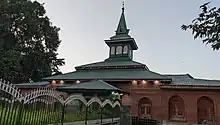Sayyid Moinuddin Hadi Naqshband | |
|---|---|
 Ziyarat Naqshband Sahab | |
| Born | Bukhara, now Uzbekistan |
| Died | 5 May 1674 |
| Resting place | Khwāja Bazar, Srinagar, Kashmir, India |
| Title |
|
| Predecessor | Hazrat Ishaan[1] |
| Successor | Sayyid Mir Jan (Uwaisiyyah line)[2] |
| Parent | Hazrat Khwaja Khawand Mahmud, known as Hazrat Ishaan |
Sayyid ul-Sadaat Sayyid Moinuddin Hadi Gilani-Naqshband al-Hasani wal-Husseini (died 5 May 1674), known as "Hazrat Naqshband Saheb", was a Sunni Saint from Bukhara and direct descendant of Prophet Muhammad, through his father Hazrat Ishaan. His father was a descendant and heir in the 7th Generation of Khwaja Bahauddin Naqshband. Moinuddin Naqshband succeeded his father in leading the Silsile Aliyya Naqshbandiyya.[1]
Ancestry
Hazrat Moinuddin Hadi Naqshband was a Sayyid, a direct descendant of the Islamic Prophet Muhammad through his daughter Fatima al Zahra and his son in law and cousin Ali ibn Abu Talib.[3]
Paternal descendance
Two paternal Sayyid lineages of him are currently known. From one line he is a direct descendant of the seventh Imam Musa al Kadhim, through his son Ibrahim al Murtadha and of the well known Sufi master Khwaja Sayyid Mir Alauddin Atar. Sayyid Alauddin Atar was the successor and son in law of Hazrat Bahauddin Naqshband. Therefore, Hazrat Ishaan is also from the progeny of Hazrat Bahauddin Naqshband. Bahauddin Naqshband was himself a patrilineal descendant of the eleventh Imam Hasan al Askari, through his son Sayyid Ali Akbar and also Sayyid Abdul Qadir Gilani through his grandmother.[4][5][6][7] Hazrat Ishaan Saheb is also known to have a familiary relationship with the Sufi saint Farid ul-din Attar.[8]
Education
Khwaja Moinuddin Hadi Naqshbandi received his initial education from his father Hazrat Ishaan and then studied Hadith sciences under the guide of the prominent Hanafi scholar Khwaja Abdul Haq Muhaddis Dehlawi. As an outstanding student he received his Ijaza in Hadith and Fiqh from Khwaja Dehlawi and promoted the Naqshbandiyya way in Lahore and Kashmir alongside his father. He accompanied his father to Lahore by the request of Shah Jahan and settled back to Kashmir after the demise of his father, representing him there. As the Qutb of his time Islamic scholars in Punjab and Kashmir were dependent from his jurisprudence. Hence he has written many works under which one was a codification of his Fatwas called Futuwae Naqhbandiyya under which the scholars of his time profited.[9]
Works
Khwaja Moinuddin Hadi Naqshband has written many books:[10]
- Futawa Naqshbandiya
- Kanzul Saadah
- Miratul Qaloob
- Sair-i- Khairul Bashar
- Mirat-u-Tayibah
- Risal dar Ahwal-i- Khwaja khawand Mahmood
- Maqamat, Mashariqul Anwar
- Risala dar-raddi-Mulahidah
- Tafsir-i-Mushif Majeed
- Risala Raddi
Spiritual rank
Hazrat Moinuddin Hadi Naqshband was Qutb, the highest ranking Wali Allah (saint) of his time. The Qutb is known as the cosmic leader of the whole universe and righteous successor of prophet Muhammad. It is said that Hazrat Ishaan stated that under his progeny there will come a son of him, who will revive the spiritual lineage and legacy of him and who will take his place as Qutb after him. The awaited successor of the Naqshbandiyya was Sayyid ul Sadaat Hazrat Sayyid Mir Jan.[1][11]
Successors
Khwaja Moinuddin Hadi Naqshband was succeeded by his grandson Nizamuddin Naqshbandi, because his three sons Khwaja Jani, Khwaja Zia and Khwaja Sharifuddin Muhammad died before him. Since Khwaja Sharifuddin Muhammad's son Khwaja Nizamuddin Naqshbandi was still too young the wife of Khwaja Moinuddin Naqshband Saheb Gul Begum took over the responsibility of the Naqshbandiyya. The line of Khwaja Moinuddin Naqshband later died out after the martyrdom of his descendant Khwaja Kamaluddin Naqshbandi, but was revived by his descendant Sayyid ul Sadaat Hazrat Sayyid Mir Jan Naqshbandi in the mid 19th century.[1][12]
See also
References
- 1 2 3 4 Tazkare Khwanadane Hazrat Eshan(genealogy of the family of Hazrat Eshan)(by author and investigator:Muhammad Yasin Qasvari Naqshbandi company:Edara Talimat Naqshbandiyya Lahore)
- ↑ Tazkare Khwanadane Hazrat Eshan(genealogy of the family of Hazrat Eshan)(by author and investigator:Muhammad Yasin Qasvari Naqshbandi company:Edara Talimat Naqshbandiyya Lahore)p. 65
- ↑ Tazkare Khwanadane Hazrat Eshan(genealogy of the family of Hazrat Eshan)(by author and investigator:Muhammad Yasin Qasvari Naqshbandi company:Edara Talimat Naqshbandiyya Lahore), p. 57-63
- ↑ "Naqshbandiya shajarasi izidan". Archived from the original on 2017-08-03. Retrieved 2017-08-03.
- ↑ "Ҳазрат Хожа Баҳоуддин Нақшбанд". Archived from the original on 2017-08-03. Retrieved 2017-08-03.
- ↑ Tazkare Khwanadane Hazrat Eshan(genealogy of the family of Hazrat Eshan)(by author and investigator:Muhammad Yasin Qasvari Naqshbandi company:Edara Talimat Naqshbandiyya Lahore) p. 57-63
- ↑ "Shajara-e-nasab lineages of descendants of Imam Hasan al-Askari r.a.-Shajara.org". Retrieved 2020-06-29.
- ↑ Damrel in Forgotten Grace, p. 20, l. 13-16
- ↑ "Hazrat Khwaja Moinud'din Naqshbandi (radiallahu anhu):The Ziyarat Of Khwaja Naqshbandh at Khwaja Bazar Srinagar". May 24, 2015.
- ↑ Forgotten Grace, David Damrel, p. 1-9
- ↑ Sufi Sheikhs of Pakistan and Afghanistan
- ↑ Nicholson, Reynold (2000). Kashf al-Mahjub of al-Hajvari. E. J. W. Gibb Memorial.